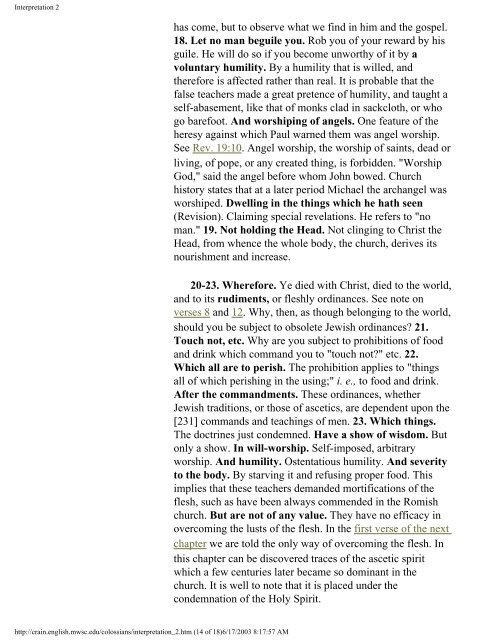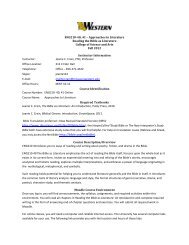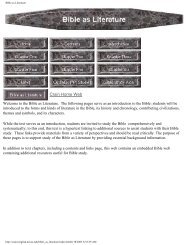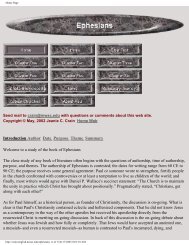Introduction to Colossians: Authorship, Date, Audience - Crain Home
Introduction to Colossians: Authorship, Date, Audience - Crain Home
Introduction to Colossians: Authorship, Date, Audience - Crain Home
You also want an ePaper? Increase the reach of your titles
YUMPU automatically turns print PDFs into web optimized ePapers that Google loves.
Interpretation 2<br />
http://crain.english.mwsc.edu/colossians/interpretation_2.htm (14 of 18)6/17/2003 8:17:57 AM<br />
has come, but <strong>to</strong> observe what we find in him and the gospel.<br />
18. Let no man beguile you. Rob you of your reward by his<br />
guile. He will do so if you become unworthy of it by a<br />
voluntary humility. By a humility that is willed, and<br />
therefore is affected rather than real. It is probable that the<br />
false teachers made a great pretence of humility, and taught a<br />
self-abasement, like that of monks clad in sackcloth, or who<br />
go barefoot. And worshiping of angels. One feature of the<br />
heresy against which Paul warned them was angel worship.<br />
See Rev. 19:10. Angel worship, the worship of saints, dead or<br />
living, of pope, or any created thing, is forbidden. "Worship<br />
God," said the angel before whom John bowed. Church<br />
his<strong>to</strong>ry states that at a later period Michael the archangel was<br />
worshiped. Dwelling in the things which he hath seen<br />
(Revision). Claiming special revelations. He refers <strong>to</strong> "no<br />
man." 19. Not holding the Head. Not clinging <strong>to</strong> Christ the<br />
Head, from whence the whole body, the church, derives its<br />
nourishment and increase.<br />
20-23. Wherefore. Ye died with Christ, died <strong>to</strong> the world,<br />
and <strong>to</strong> its rudiments, or fleshly ordinances. See note on<br />
verses 8 and 12. Why, then, as though belonging <strong>to</strong> the world,<br />
should you be subject <strong>to</strong> obsolete Jewish ordinances? 21.<br />
Touch not, etc. Why are you subject <strong>to</strong> prohibitions of food<br />
and drink which command you <strong>to</strong> "<strong>to</strong>uch not?" etc. 22.<br />
Which all are <strong>to</strong> perish. The prohibition applies <strong>to</strong> "things<br />
all of which perishing in the using;" i. e., <strong>to</strong> food and drink.<br />
After the commandments. These ordinances, whether<br />
Jewish traditions, or those of ascetics, are dependent upon the<br />
[231] commands and teachings of men. 23. Which things.<br />
The doctrines just condemned. Have a show of wisdom. But<br />
only a show. In will-worship. Self-imposed, arbitrary<br />
worship. And humility. Ostentatious humility. And severity<br />
<strong>to</strong> the body. By starving it and refusing proper food. This<br />
implies that these teachers demanded mortifications of the<br />
flesh, such as have been always commended in the Romish<br />
church. But are not of any value. They have no efficacy in<br />
overcoming the lusts of the flesh. In the first verse of the next<br />
chapter we are <strong>to</strong>ld the only way of overcoming the flesh. In<br />
this chapter can be discovered traces of the ascetic spirit<br />
which a few centuries later became so dominant in the<br />
church. It is well <strong>to</strong> note that it is placed under the<br />
condemnation of the Holy Spirit.






![[38cb1273][0][sourcelist][1][0] - Crain Home](https://img.yumpu.com/2168350/1/190x245/38cb12730sourcelist10-crain-home.jpg?quality=85)